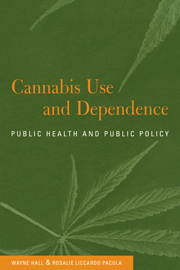Book contents
- Frontmatter
- Dedication
- Contents
- List of figures and tables
- Foreword
- Acknowledgements
- 1 Introduction
- Section 1 Cannabis the drug and how it is used
- Section 2 The health effects of cannabis
- Section 3 The psychological effects of chronic cannabis use
- Section 4 Effects on adolescent development
- Section 5 Harms and benefits of cannabis use
- 12 Comparing the health effects of cannabis with alcohol and tobacco
- 13 The benefits of cannabis use
- Section 6 The effectiveness and costs of cannabis prohibition
- Section 7 Policy alternatives
- Appendix 1
- Appendix 2
- References
- Index
13 - The benefits of cannabis use
from Section 5 - Harms and benefits of cannabis use
Published online by Cambridge University Press: 05 July 2016
- Frontmatter
- Dedication
- Contents
- List of figures and tables
- Foreword
- Acknowledgements
- 1 Introduction
- Section 1 Cannabis the drug and how it is used
- Section 2 The health effects of cannabis
- Section 3 The psychological effects of chronic cannabis use
- Section 4 Effects on adolescent development
- Section 5 Harms and benefits of cannabis use
- 12 Comparing the health effects of cannabis with alcohol and tobacco
- 13 The benefits of cannabis use
- Section 6 The effectiveness and costs of cannabis prohibition
- Section 7 Policy alternatives
- Appendix 1
- Appendix 2
- References
- Index
Summary
In this chapter we consider four possible benefits of cannabis use; (1) the possible benefits of recreational cannabis use; (2) the possible mental health benefits of cannabis use; (3) the possibility that young people may use cannabis instead of other more harmful drugs, such as alcohol, heroin or cocaine; and (4) the possible medical uses of cannabis and cannabinoids.
The benefits of recreational cannabis use
The reasons that young people give for using cannabis are similar to the reasons they give for using alcohol. Among daily cannabis users, for example, Johnston (1981) found that most reported using it cto feel good or get high’ (94%) and ‘to have a good time with my friends’ (79%). Two-thirds said that they used it to relax. Johnston and O'Malley (1986) also found that the reasons given for using cannabis matched those given for drinking alcohol. If one accepts the operating assumption of economists that adults are the best judges of their own interests the fact that cannabis is widely used by adults for recreational reasons would show that it has benefits for many of those who use it. This is clearest for those cannabis users who do not report any adverse effects of their use, which the Australian National Survey of Mental Health and Wellbeing found was approximately twothirds of adults who had used 5 or more times in the past year (Degenhardt and Hall, 2001).
Mental health benefits of cannabis use
Moderate alcohol use is associated with reduced mortality from cardiovascular disease (e.g. Chyou et al, 1997; Klatsky, 1999; Sacco et al., 1999). A number of studies have found a similar relationship between moderate alcohol use and mental health (Power et al., 1998; Rodgers et al., 2000; Degenhardt et al., 2001). Moderate alcohol users have lower rates of anxiety and affective disorders than abstainers or heavier users of alcohol but it is not yet clear whether moderate alcohol use is good for mental health or whether those with better mental health are more likely to drink moderately (Rodgers et al., 2000; Degenhardt et al., 2001).
- Type
- Chapter
- Information
- Cannabis Use and DependencePublic Health and Public Policy, pp. 142 - 154Publisher: Cambridge University PressPrint publication year: 2002



